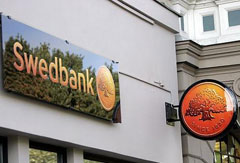Banks, EU – Baltic States, Financial Services
International Internet Magazine. Baltic States news & analytics
Saturday, 02.08.2025, 09:53
Swedbank posts net loss as loan losses soar in Baltic States
 Print version
Print version |
|---|
Analysts surveyed by Bloomberg had estimated a net loss of 2.1 billion kronor. Loan losses and provisions rose to 6.12 billion kronor, from 812 million kronor a year earlier, writes ELTA/LETA.
Loan losses at Swedbank and SEB AB, the second-largest lender in the Baltics, have soared as the three Baltic States struggle with the steepest recessions in the 27-member European Union. Swedbank this month raised 15.1 billion kronor in its second rights offer in less than a year, following a capital injection of 12.4 billion kronor from shareholders last year. "We see signs in Baltic Banking that credit quality is no longer weakening at the same rate as before," Swedbank said in the statement. "The level of new impaired loans was somewhat lower during the third quarter than in the second quarter and our forecast that new impaired loans will be lower during the second half of 2009 than the first half remains unchanged."
The impact of the economic recession on the results of the bank's activities has not disappeared yet, however, there are already first signs of macroeconomic stabilization, claims Swedbank.
Over January-September of this year, the Swedbank's pre-tax and pre-provision profit in Lithuania totaled 381.7 million litas (110.6 million euros). Due to the provisioning for potential loan losses in 2009 the bank group incurred 592.3 million litas (171.7 million euros) losses. Compared to the same period of the year 2008 the revenues decreased by 23%, making up 628 million litas (182.1 million euros), and operating costs decreased by 30%, making up 246.3 million litas (71.42 million euros). During the third quarter, customers' deposits fell 2%, and the loan portfolio declined by 3%.
The previous loan growth tendency was substituted by the loan market decline, a natural phenomenon with corporate and personal income decline, while maintaining a balanced income and loan ratio. For these reasons, during the third quarter the bank's lending volumes fell by 3%. Swedbank also claims that the bank's loyalty to the Lithuanian domestic market strategy remains the same – Swedbank has established itself in the Baltic markets for a long time.
The third quarter operating profit before provisions of Swedbank’s Estonian unit was 586 mln kroons, the net loss of the quarter was 323 mln kroons, Postimees Online/LETA reports.
The revenues of the bank fell in the third quarter by 8% to 1.045 billion kroons and operating costs, without taking into consideration extraordinary expenditures and change of accounting methods, fell 2% to 410 mln kroons.
The deposits of clients were stable during the quarter. The bank’s loan portfolio fell by 3%.
The quality of assets and loan losses affected the results of the bank in the third quarter most.
The net loan losses of Swedbank’s Estonian unit amounted in the third quarter to 903 mln kroons.
The growth of indebted loans, which comes mainly from the real estate sector, slowed down during the quarter.
Operational profit of Swedbank in Latvia totaled LVL 20 million in the third quarter of 2010, whereas the bank's net result for the period was loss of LVL 88 million, as the bank's press secretary Kristine Jakubovska told LETA.
In the third quarter, Swedbank’s revenue from core activities totaled LVL 41 million, or 14 % less than in the second quarter of the year, while operating expenses totaled LVL 21 million, or 39 % more than in the second quarter.
Over the first nine months of 2010, Swedbank’s revenue from core activities reduced by 18 %, down to LVL 128 million; the bank's expenses shrank 16 % to LVL 53 million, resulting in a 41.8 % income ratio, Jakubovska explained.
The bank's revenues in the third quarter were impacted during by a combination of higher provisions, low money market rates and lower lending volumes.
Due to shrinking business activity, over the first nine months of this year the bank reduced the number of its employees by 25 % and closed down 13 % of its branches.
In the third quarter, net loan losses of Swedbank in Latvia totaled LVL 120 million; the rate of increase in impaired loans slowed during the period.
Lending volume decreased 7 % in the third quarter. Baltic economies are still considered to be a region with higher risk as a consequence of regional downturn paired with global financial crisis, and the cost of funding remains considerably higher than a few years ago. The amount of deposits shrunk by 8 % in the third quarter, as the total incomes of households continued to fall.
Swedbank analysts expect slower growth in impaired loans closer to the year-end and leave 2009 behind as the most challenging year in terms of credit losses.
The bank focuses on long-term relationship with its clients, providing tools and knowledge for money matters and taking into account preventive efforts to limit the negative effects of the recession and finding a sustainable solution for all parties during the coming quarters.
The bank's strategy remains the same in respect to the commitment to the Latvian market and it is Swedbank Group's intention to stay in the Baltics long-term.
"Early signs of recovery are already visible globally, however, one must take into account that the pace of this recovery will be slow. In terms of volume, the Latvian economy has relapsed onto 2005 levels. What society expects today of those who are at the forefront, including banks, is solutions, competence and responsibility," notes Maris Mancinskis, the head of Swedbank.








 «The Baltic Course» Is Sold and Stays in Business!
«The Baltic Course» Is Sold and Stays in Business!

